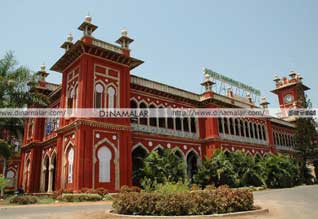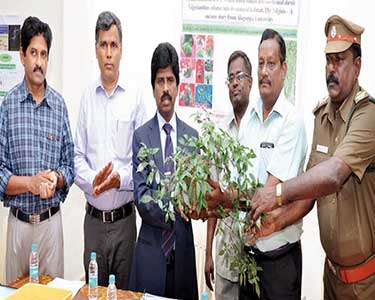சேதுபாவாசத்திரம் வட்டாரத்தில் வீரிய ஒட்டு மக்கா சோளம் சாகுபடியில் தொழில் நுட்பங்களை கையாண்டால் அதிக மகசூல் பெறலாம் என்று சேதுபாவாசத்திரம் வட்டார வேளாண்மை உதவி இயக்குனர் பெரியசாமி விளக்கமளித்துள்ளார். இதுகுறித்து அவர் கூறியிருப்பதாவது: மக்கா சோளம் கால்நடை தீவனமாகவும், சமையல் எண்ணை எடுப்பதற்காகவும் பயன்படுவதுடன் தொழிற்சாலைகளில் மக்காச்சோளம் ஸ்டார்ச், பிரீவர்ஸ், மக்காச்சோளம் மைதா, சிரப், சர்க்கரை, குளுக்கோஸ் போன்ற பல பொருட்கள் தயரிக்கவும் பயன்படுகிறது. இதில் கோ-1, கே-1, கங்கா -5, கே.எச் -1,2,3, கோஎச்.எம் -5, எம் -900, எம்.ஹைசெல், சின்ஜென்டா, என்.கே -6240, பயனீர் -30 வி -62, பயனீர் -30 வி -92 மற்றும் பிக்பாஸ் ஆகியன முக்கிய வீரிய ஒட்டு ரகங்களாகும்.
ஏக்கருக்கு 6 கிலோ விதை பயன்படுத்த வேண்டும். விதை மூலம் பூசன நோயை தடுக்க 1 கிலோ விதைக்கு 4 கிராம் டிரைகோ டெர்மா விரிடி என்ற உயிரியல் பூசான கொல்லியை கலந்து 24 மணிநேரம் வைத்திருந்து பின்பு விதைக்க வேண்டும். இத்துடன் உயிர் உரவிதை நேர்த்தியும் செய்யவேண்டும். 1 ஏக்கருக்கு 500 கிராம் அசோஸ்பைரில்லம் மற்றும் பாஸ்போ பாக்டீரியாவை ஆரிய வடி (அரிசி) கஞ்சியில் கலந்து அதனுடன் பூசன விதை நேர்த்தி செய்த விதையை கலந்து நிழலில் அரை மணிநேரம் உலர்த்தி பின் 60 X 20 செ.மீ இடைவெளியில் 4 செ.மீ ஆழத்தில் விதையை ஊன்ற வேண்டும்.
விதைத்த 3 நாட்களுக்குப்பின் மண்ணில் போதுமான ஈரம் இருக்கும் போது களைக்கொல்லியை கைத்தெளிப்பான மூலம் தெளிக்கவேண்டும். களைக்கொல்லி பயன்படுத்தாவிடில் கை களை எடுக்கவேண்டும். தேவைக்கேற்ப 6 முதல் 8 முறை நீர்பாசனம் செய்யவேண்டும். பூக்கும் தருனத்தில் தண்ணீர் பற்றாக்குறை இல்லாமல் பார்த்துக் கொள்ளவேண்டும். இவ்வாறு தொழில் நுட்பங்களை கடை பிடித்தால் 1 ஏக்கரில் 2,500 முதல் 3,000 கிலோ வரை மகசூல் எடுத்து ரூ.45,000 ரூபாய் வரை வருமானம் பெறலாம். இவ்வாறு வேளாண் உதவி இயக்குனர் பெரியசாமி தெரிவித்துள்ளார்.
source : dinakaran
ஏக்கருக்கு 6 கிலோ விதை பயன்படுத்த வேண்டும். விதை மூலம் பூசன நோயை தடுக்க 1 கிலோ விதைக்கு 4 கிராம் டிரைகோ டெர்மா விரிடி என்ற உயிரியல் பூசான கொல்லியை கலந்து 24 மணிநேரம் வைத்திருந்து பின்பு விதைக்க வேண்டும். இத்துடன் உயிர் உரவிதை நேர்த்தியும் செய்யவேண்டும். 1 ஏக்கருக்கு 500 கிராம் அசோஸ்பைரில்லம் மற்றும் பாஸ்போ பாக்டீரியாவை ஆரிய வடி (அரிசி) கஞ்சியில் கலந்து அதனுடன் பூசன விதை நேர்த்தி செய்த விதையை கலந்து நிழலில் அரை மணிநேரம் உலர்த்தி பின் 60 X 20 செ.மீ இடைவெளியில் 4 செ.மீ ஆழத்தில் விதையை ஊன்ற வேண்டும்.
விதைத்த 3 நாட்களுக்குப்பின் மண்ணில் போதுமான ஈரம் இருக்கும் போது களைக்கொல்லியை கைத்தெளிப்பான மூலம் தெளிக்கவேண்டும். களைக்கொல்லி பயன்படுத்தாவிடில் கை களை எடுக்கவேண்டும். தேவைக்கேற்ப 6 முதல் 8 முறை நீர்பாசனம் செய்யவேண்டும். பூக்கும் தருனத்தில் தண்ணீர் பற்றாக்குறை இல்லாமல் பார்த்துக் கொள்ளவேண்டும். இவ்வாறு தொழில் நுட்பங்களை கடை பிடித்தால் 1 ஏக்கரில் 2,500 முதல் 3,000 கிலோ வரை மகசூல் எடுத்து ரூ.45,000 ரூபாய் வரை வருமானம் பெறலாம். இவ்வாறு வேளாண் உதவி இயக்குனர் பெரியசாமி தெரிவித்துள்ளார்.
source : dinakaran







